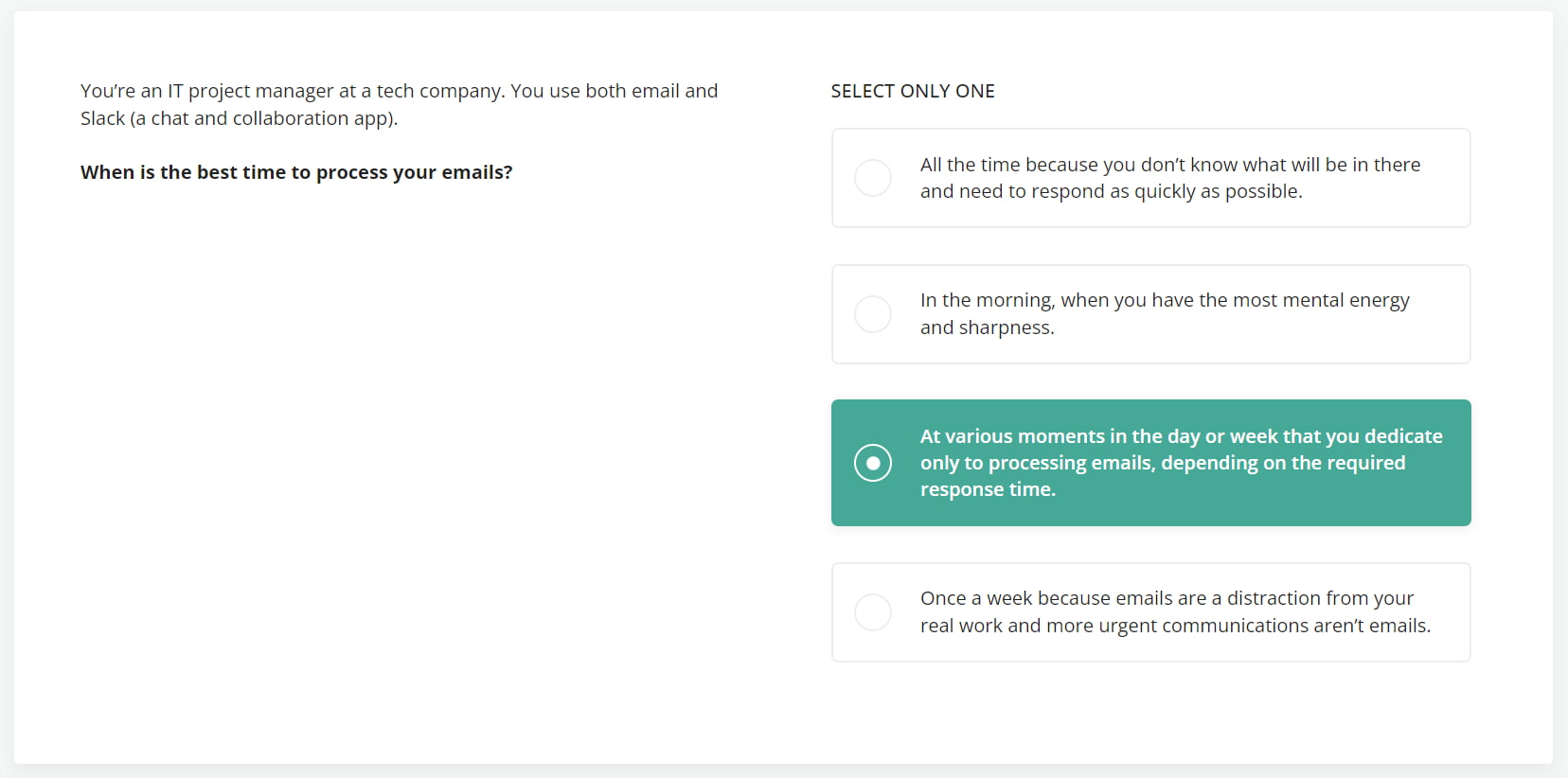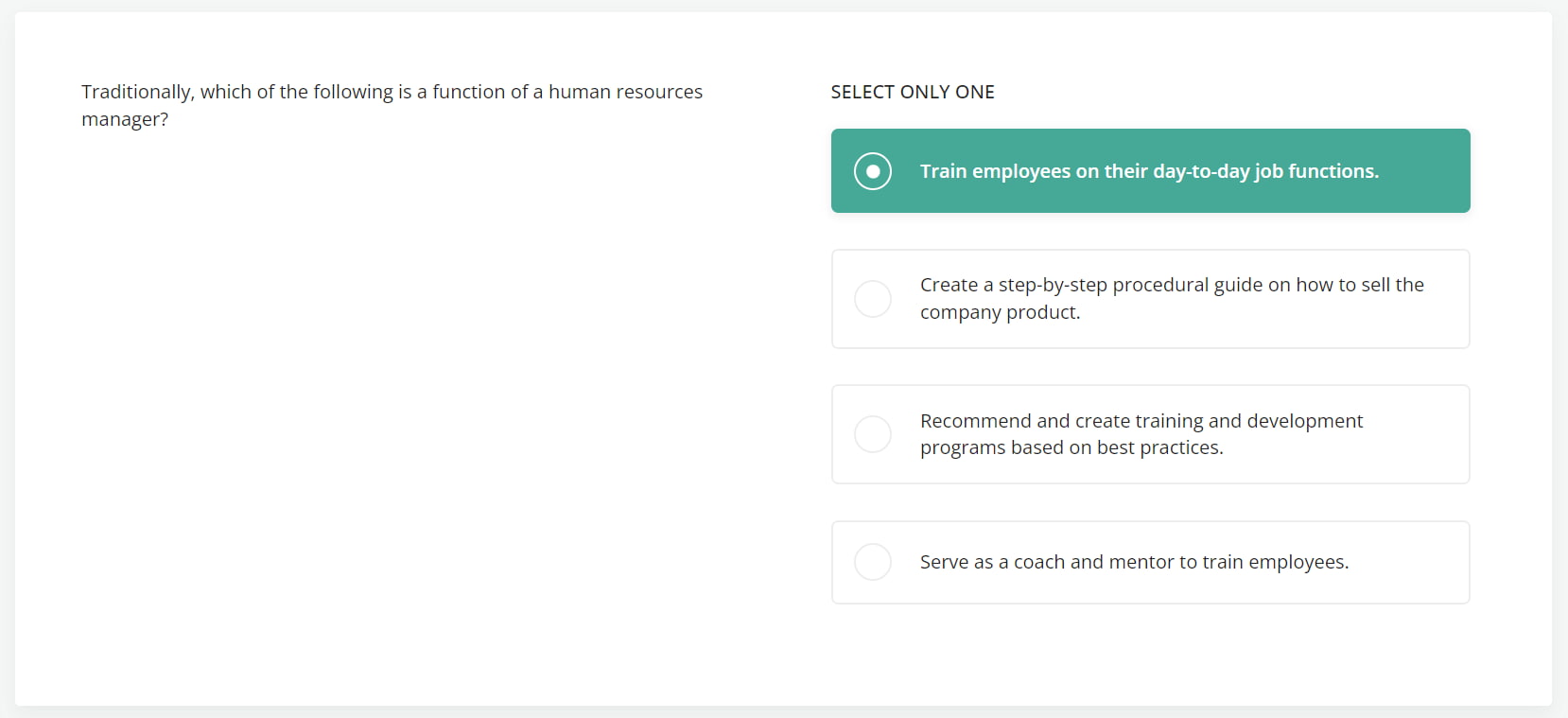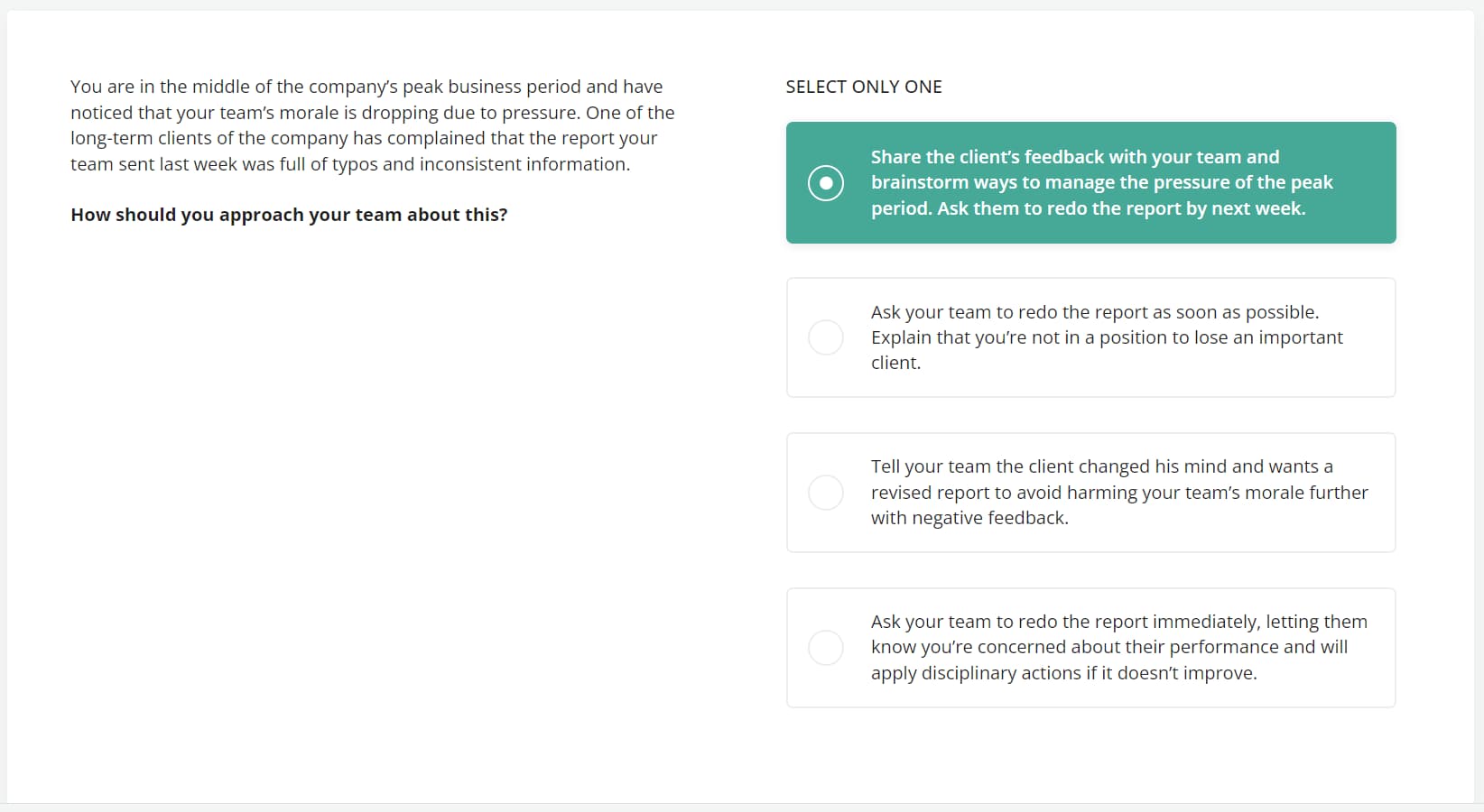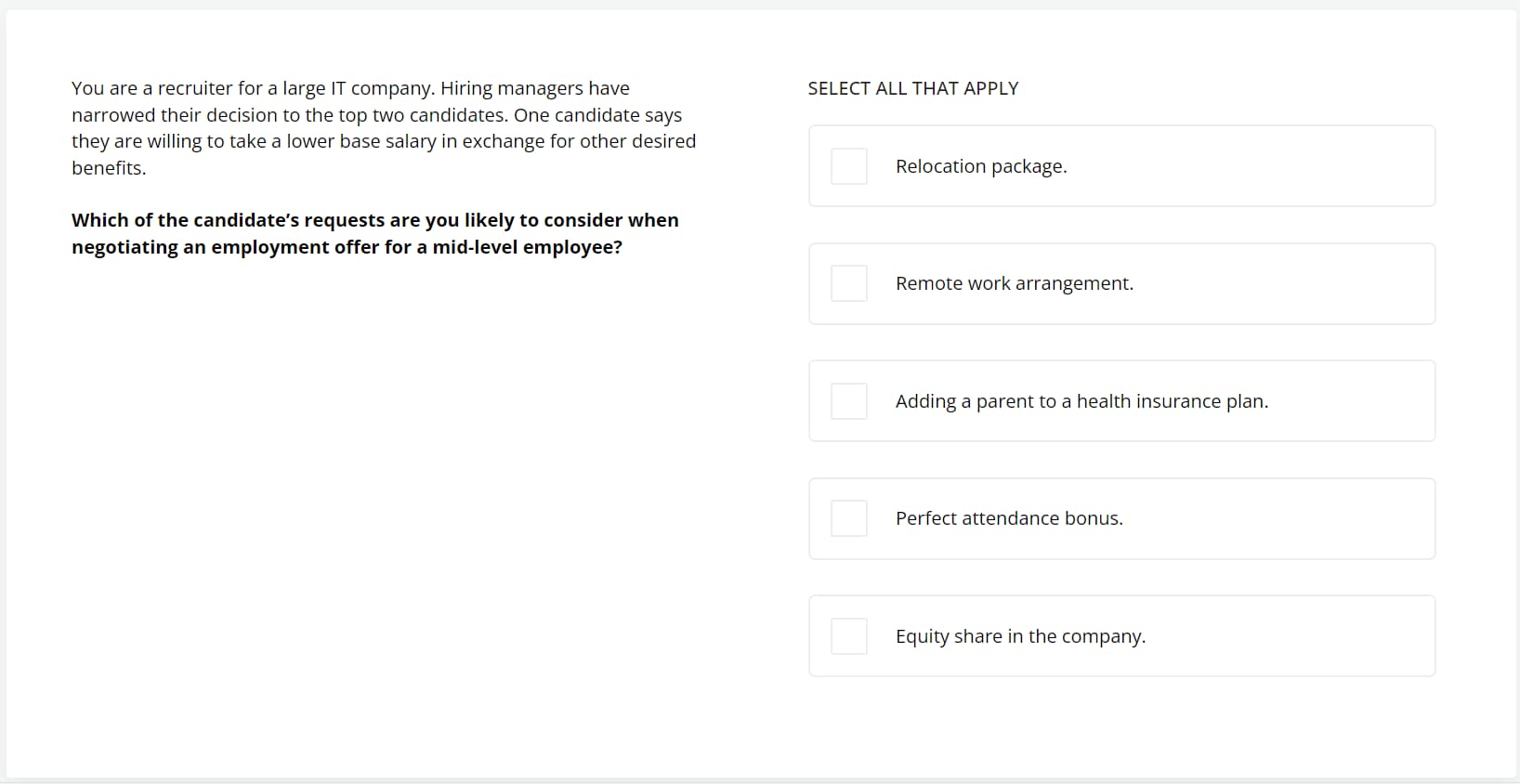The HR department is vital in every business and a major organizational change driver. It’s responsible for recruiting new employees, overseeing onboarding and career development, and ensuring the company adheres to labor laws.
Specific HR competencies are critical. An HR team with the right skills, like communication, organization, talent acquisition, and leadership, helps your business expand to new horizons.
This article describes the 10 HR core competencies and how to assess them. It also explains how competency in HR has evolved and what awaits.
Table of contents
- What are HR competencies?
- What are the top 10 must-have competencies for HR professionals?
- How to improve and develop these 10 HR competencies
- How have HR competencies evolved in the past few years?
- What’s the future of HR competencies in the AI age?
- Assess and hire the best HR employees with TestGorilla
- HR competencies FAQs
What are HR competencies?
HR competencies are core skills and traits that enable human resources professionals to execute their jobs properly. These abilities include communication, negotiation, talent acquisition, business acumen, leadership, and analytical thinking. You must have a stellar HR department capable of looking after your employees, and this need only grows with large or medium-sized companies with many moving pieces.
Gaining a better understanding of human resources core competencies prepares you to make decisions that have long-lasting effects on your entire organization.
What are the top 10 must-have competencies for HR professionals?
Communication skills
Time management
Negotiation skills
HR fundamentals
Talent acquisition
Critical thinking
Attention to textual detail
Leadership and people management
Analytical skills
Cognitive flexibility
These 10 capabilities give you an overview of what HR employees should know and how to assess them during hiring initiatives. The following isn’t an exhaustive list of HR skills and competencies, but they are foundational abilities.
1. Communication skills
Great communication skills are indispensable for every job but are especially important as an HR competency.
The right behavioral competencies, including communication, separate outstanding HR professionals from good ones.
HR professionals rely on solid communication for many reasons:
Help new hires with their orientation
Teach staff company rules
Write safety materials
Communicate important government regulations to staff
Communication is one of the HR competencies that professionals need to hone and improve constantly. They may need to explain workplace practices and job duties, assuage employees, or lay out the rules if someone breaks them.
How to assess communication skills
Gauge HR candidates’ communication skills with talent assessments for the most accurate results.
Our Communication test helps you evaluate a candidate’s ability to actively listen, understand and interpret information, and communicate clearly. It also shows you whether or not they can follow professional work etiquette.
Those who score well on this test can communicate openly, build trust, and offer empathy and feedback when needed.
Learn more about talent assessments and how to use them in our product tour.
You can also gain insight into a candidate’s communication skills by observing how they act and speak during the interview process. Look for clues like whether they understand important information quickly, express their thoughts clearly and communicate professionally.
2. Time management
Time management and organizational skills are vital in a work environment, so HR professionals must manage their time effectively, including planning, scheduling and executing tasks, and managing deadlines.
HR employees often deal with vacant roles that they must fill quickly. They have to jump to rapid onboarding so the new employee can begin work immediately.
To handle these types of scenarios, recruiters require excellent time-management and organizational skills.
How to assess time-management skills
You can evaluate applicants’ time-management skills with a Time Management test.
This test assesses how well candidates can manage their time in a professional environment, including their ability to plan, prioritize, execute, plan, and reflect.
Candidates who do well on this test can distinguish urgent and important tasks from minor ones, plan, and coordinate with others. They can also overcome distractions, evaluate their work, and adjust if needed.
This ability is nearly impossible to evaluate with traditional hiring methods, like screening resumes. Skills-based hiring practices offer a reliable way to know if a candidate possesses the time management skills you need.
3. Negotiation skills
Negotiation skills are front and center when it comes to HR work – especially when you need to assess HR manager skills.
The ability to negotiate is one of the most crucial recruiter competencies, enabling them to influence others for the organization’s benefit and settle deals favorably. It also helps HR employees conclude good deals with health coverage providers and unions.
Negotiation is a key part of conflict resolution, which lets HR staff mediate heated conversations and find a satisfactory settlement.
How to assess negotiation skills
Our Negotiation test helps you test candidates’ ability to influence and drive discussions.
Applicants with great test results can use others’ feelings positively to bring a mutually beneficial conclusion to a deal or reach a particular objective.
These candidates can create win-win situations and maintain positive relationships with business partners and colleagues.
4. HR fundamentals
Fundamental HR skills and competencies are their own category, apart from standard communication, negotiation, and business acumen. They include developing, maintaining, and improving HR policies and successfully managing relationships.
Fundamental HR competencies also enable employees to align HR policies with government laws.
Moreover, candidates with strong fundamental human resource expertise can help the company address any issues related to hiring and training new employees and retaining existing ones.
Understanding HR fundamentals is crucial when assessing an HR generalist because they don’t have a highly specific, specialized field to examine.
How to assess fundamental HR skills
The HR Fundamentals test evaluates a candidate’s knowledge of HR best practices, including:
The ability to manage relationships
Consultation capabilities
Business acumen
See the test in action by checking out these HR fundamentals sample questions.
This test helps you understand how a candidate manages current staff. It also proves critical recruiter competencies such as hiring skills.
Successful candidates have deep technical and behavioral knowledge. They can identify important challenges and help achieve powerful organizational goals.
5. Talent acquisition
Talent-acquisition skills are essential for solid competency in HR. To grow on their career path, an HR professional needs to go beyond recruiting – they need to understand how to find the ideal candidate for the role.
Attracting top professionals to your business is becoming more difficult because every organization vies for job seekers’ attention with compensation and benefits packages. Therefore, your HR team must devise better strategies to acquire top talent.
Finding and contacting candidates is an important HR competency. HR leaders need to take a proactive approach in their search and constantly try to find new people through different channels.
How to assess talent-acquisition skills
HR employees must be proficient with all the recruitment tools they use in their jobs, including screening software, interviewing tactics, and referral programs.
Our Talent Acquisition test evaluates candidates’ expertise in sourcing talent and employee retention.
The core skills this test covers are sourcing, recruitment tactics, candidate experience, and onboarding strategies.
Successful candidates have practical experience in talent acquisition, can assess an organization’s current and future talent needs, and create and implement actionable steps to land top talent off the bat.
6. Critical thinking
Critical thinking – the ability to think clearly and make sound judgments – is one of the top HRM competencies.
HR employees who possess this skill can conceptualize, analyze, and evaluate information to make informed decisions. For example, critical thinking helps recruiters analyze candidates and hire with reduced bias. It’s also a top skill for workforce planning and change management.
These candidates can also solve issues and take measures to mitigate risk and prevent such problems from arising in the first place.
Critical thinking is one of the vital competencies of human resource professionals because it enables them to create new systems and solutions, which leads to more effective HR practices.
How to assess critical-thinking skills
You can measure this human resource competence with the Critical Thinking test.
This test assesses applicants’ ability to understand cause-and-effect relationships, interpret sequences and arrangements, and use deductive reasoning to achieve results.
Successful candidates can tap into their independent thought processes and create innovative solutions to solve complex problems. The test helps you discover people with strong logic who can use it to the company’s advantage.
7. Attention to textual detail
True human resource expertise includes great attention to detail. Since HR employees communicate with a wide range of people daily, they need great attention to detail, especially during the hiring process.
A keen eye helps recruiters remember important information and spot discrepancies in applicants’ resumes and skills. These skills help HR professionals avoid bad hires that could prove costly in the long run.
In addition, spotting errors, from small ones like typos to large ones like inaccurate data, is one of the human resources skills and competencies that mitigates potentially damaging organizational issues, such as incorrectly managed employee benefits.
This important skill helps HR employees prevent mishaps that can negatively impact the company’s reputation or result in lawsuits.
How to assess attention to textual detail
Our Attention to Detail test assesses a candidate’s ability to match and filter information, compare statements, and check for consistency across documentation.
The test provides insights into applicants’ attentiveness by asking them to recognize errors and omissions in the information presented. It helps you understand a candidate’s ability to spot small, unprofessional mistakes and serious errors.
Candidates who succeed on this test have the ability to accurately process textual information and arrive at the correct solution quickly and efficiently.
8. Leadership and people management
The behavioral competencies of HR are some of their strongest abilities, and leadership is one of the most important ones.
Leading and managing people is a core HR competency every human resource professional should possess.
HR employees drive positive organizational change with their great people skills and ability to develop innovative solutions to complex problems.
Great leaders inspire their colleagues and take charge, helping them reach business goals quickly and efficiently. HR professionals who are natural leaders help your organization manage employees and work processes effectively.
HR professionals with powerful leadership skills can also help staff develop their skills, grow in their roles, and reach their career goals, leading to more successful, satisfied employees.
How to assess leadership skills
You can evaluate leadership skills with our Leadership & People Management test.
The test evaluates a person’s ability to delegate tasks, provide guidance and feedback to employees, plan and encourage others’ development, and obtain company-wide acceptance of their ideas.
Successful applicants have a skill set that can unite people, lead them by example, provide inspiration, and achieve company goals.
You can also find keen leadership skills with different personality tests that gauge soft skills:
16 Personalities test
DISC test
Big 5 (OCEAN) test
A great example is the 16 Personalities test, based on the work of Carl Jung. This test evaluates a person’s energy and inspiration source and how they process information and make decisions. It reveals the candidate’s inner world and how they perceive their surroundings.
Understanding the candidate’s personality type gives you a better idea of their HR competencies and how they lead their team.
Another way to gauge leadership competency in HR is through our HR Management test, which evaluates an applicant’s ability to manage multiple programs and projects, guide stakeholder decisions, and mediate conflict.
9. Analytical skills
Recruiters need excellent analytical skills to make better decisions when hiring new candidates, reduce recruitment costs, and pinpoint areas for improvement.
The ability to study the numbers and spot what works and what doesn’t helps your business be more competitive.
You can have the best HR analytics software on the market, but it doesn’t make a difference if your HR staff doesn’t have keen technical literacy to interpret and use the data.
HR employees who can analyze data efficiently are better equipped to make the right hiring decisions and improve recruitment processes.
How to assess analytical skills
Our Working with Data test assesses a person’s ability to perform data analysis and understand data concepts, how they work with charts and graphs, and how they interpret information.
Applicants who perform well on this test possess a strong grasp of data concepts. They can examine various data sets, interpret them, and produce simple visualizations to make the data easier to comprehend.
An HR employee who can visualize trends backed by data can get approval to carry out their plans for improving the business and making the recruitment process simpler and more efficient.
10. Cognitive flexibility
Cognitive flexibility is a human resources competency that enables people to learn and unlearn information, quickly grasp how new technologies work, and determine how they can use them to their benefit.
This ability shows an applicant’s adaptability, creativity, and curiosity.
If something isn’t working out as planned, cognitive flexibility prompts an HR professional to change tactics and find new ways to deal with the problem.
This skill is an asset to every recruiter since they need to constantly change their recruitment strategies, work with various people, and improve the company’s HR processes.
How to assess cognitive flexibility
You can learn about candidates’ cognitive flexibility by asking them for a specific example of how they dealt with a problem at work or in their personal lives. Look for candidates who can come up with interesting ways to look at and solve an issue.
In addition, anyone who is constantly learning new things and adapting to change likely has a high degree of cognitive flexibility. Did the candidate get additional training irrespective of their work duties? Do they manage a side hustle alongside their typical work?
Looking for applicants who constantly try to improve themselves is one of the biggest green flags when searching for cognitive flexibility.
You can also use talent assessments like our Problem Solving test or Big 5 (OCEAN) test. For example, the Big 5 (OCEAN) test gauges a candidate’s openness and agreeableness, giving insight into their willingness to learn new things.
To learn more about how to gauge cognitive flexibility, book a demo and talk to one of our knowledgeable staff members.
The best insights on HR and recruitment, delivered to your inbox.
Biweekly updates. No spam. Unsubscribe any time.
How to improve and develop these 10 HR competencies
HRM competencies constantly change and evolve, so a human resource professional must be ready to develop at every opportunity.
They must be ready to manage new policies and laws and stay up-to-date on the best hiring techniques.
Here are our top five recommendations on how to develop and improve human resource competence:
Methods | Description |
Gauge skills with talent assessments to find a starting point | Leveraging skills tests to find baseline competency levels helps discover which skills are strongest and which need the most improvement |
Find a supportive community | Relying on others, such as social media groups and employee resource groups, helps provide support and answer common questions |
Consider mentorship | Mentoring under a seasoned expert helps HR professionals learn more and build confidence |
Seek out professional development opportunities | Signing up for official HR courses provides a wealth of learning opportunities and helps connect professionals to others in their field |
Commit to continuous improvement | Developing a continuous learning mindset instills a vital belief that you never finish improving |
Continuous improvement is an HR professional’s most important trait. Even human resource core competencies never stop evolving, and essentials from a few years ago may no longer be relevant.
Human resource professionals must stay on their toes and acknowledge that they’re never done learning new things.
Dive into powerful insights using TestGorilla
Dive into powerful insights on cognitive abilities with our free live demo.
How have HR competencies evolved in the past few years?
HR functions have evolved immensely, and forward-thinking human resource departments need to adapt to these changes rather than resist them.
The top ways HR has evolved include:
Digital transformation
Employee engagement
Skills-based hiring
Digital transformation is one of the most impactful changes hitting HR, just like many other work fields. Here are the biggest impacts technology has had on HR functions:
Ways that companies have digitally transformed | Description |
Social media presence | Recruiters depend on social media to find, recruit, and retain employees HR uses social media to maintain the company’s reputation and build rapport with potential hires |
Technology | HR professionals must know how to effectively use human resources tools, such as applicant tracking systems and talent assessment software |
Remote hiring | Remote employee management is an essential skill It includes conducting remote interviews, coordinating with people in different time zones, and onboarding remotely |
Remote human resources competencies are non-negotiable. Given the chance, 87% of employees choose to work flexibly, meaning they can do their job from home and the office.
Further, 59% of employees would like to work remotely “as much as possible.”
This attention to employee satisfaction and engagement is an HR competency on its own. HR departments must create new ways to engage employees since it’s costly to keep hiring new ones.
According to the Center for American Progress, around 20% of an employee’s annual salary goes into the cost of trying to replace them if they leave. That’s close to $10,000 for employees earning $50,000 annually.
You can also reduce replacement costs by adopting skills-based hiring.
Skills-based hiring decreases recruitment costs by assessing an applicant’s skills before hiring them, which reduces the number of bad hires dismissed shortly after starting their jobs.
Bad hires cost an average of $14,900, which makes accurate candidate screening paramount.
Pre-employment talent assessments aid recruiters in the hiring process and should be a staple HR competency in the ever-changing labor market.
What’s the future of HR competencies in the AI age?
HR departments must expand their toolsets and methods for handling employees and making recruitment decisions and changes in the organizational culture.
Social media, remote work, and new and emerging technologies continue to impact how companies do business, and HR professionals need to consider these changes.
AI in HR is an increasing trend. Many companies use human resources AI and automation to generate correspondence with candidates and ensure data-driven, effective communication during the hiring process.
AI helps fill in small, tedious gaps in your processes, improving the employee experience – and businesses with HR departments that improve the employee experience are 1.3 times more likely to have organizational outperformance than those that don’t.
Human resources skills and competencies now include AI literacy. It also depends on the ability to embrace a different company culture, fostering new HR technologies to convince leadership of their importance for decision-making and performance management.
Does this mean that traditional human resources competencies are obsolete? Not at all. Even with AI assistance, keeping the “human” in human resource management by staffing your HR department with empathetic, compassionate employees is crucial.
Assess and hire the best HR employees with TestGorilla
When hiring a new recruiter, evaluate their HR competencies to ensure they can keep your workers happy and engaged, create change, and improve productivity.
Human resources core competencies include great communication and people-management skills, organization, talent acquisition, and cognitive flexibility.
You can find these vital abilities confidently when you use talent assessments to gauge HR candidates. Sign up for a free forever plan to start using skills tests today.
You can also book a demo to learn more about the features of our platform, pricing plans, and how to implement talent assessments into your recruitment process.
For more insights and a step-by-step guide on talent assessments that you can access straight away, check out our product tour.
HR competencies FAQs
Let’s wrap up with a few frequently asked questions about the competencies of human resource professionals.
What are HR core competencies?
Communication and active listening
Critical thinking
Time management
Negotiation
Talent acquisition
Cognitive flexibility
Leadership and people management
Attention to detail
Analytical skills
Interpersonal skills
Business acumen
To learn more about these skills and how to assess them, please scroll to the top of this article and read the "What are the top 10 must-have competencies for HR professionals?" section.
What are the competencies of an HR generalist?
The competencies of HR generalists include technical literacy, knowledge of employment laws, business acumen, talent acquisition, communication, and organization. HR generalists don’t have a specified field of expertise, so it’s important to have a reliable method for gauging fundamental skills, such as conducting structured interviews or using talent assessments.
What are the different teams in an HR department?
HR departments comprise several key teams, including talent management and acquisition, learning and development, compensation and benefits, and compliance and work safety. Although professionals in smaller companies do some or all of these roles by themselves, it’s better to separate them if your organization is large enough and you have the staff and budget. The talent management and acquisition team might be the most important HR team for a company’s success.
This team is responsible for scouting, recruiting, developing, and retaining employees. As the recruiters of your business, this team is in charge of building your workforce. The talent and acquisition team members create new positions within your organization, write job ads, scout talent, and hire new employees.
How are HR competencies classified?
HR competencies are classified into four categories: technical competencies, interpersonal competencies, strategic competencies, and functional competencies. All foundational HR competencies fit into these categories, regardless of specific roles and specialized fields. For example, a talent acquisition specialist or HR business partner has core competencies that fit into these four categories.
What is the T-shaped HR competency model?
The T-shaped HR competency model is the concept of developing a certain number of base skills, knowledge, and behaviors to ensure success in an HR role. A T-shaped competency helps HR professionals build and maintain foundational skills and branch out into specialized competencies. This foundation of skills creates the top portion of a “T,” with additional abilities branching downward as the rest.
You've scrolled this far
Why not try TestGorilla for free, and see what happens when you put skills first.



















